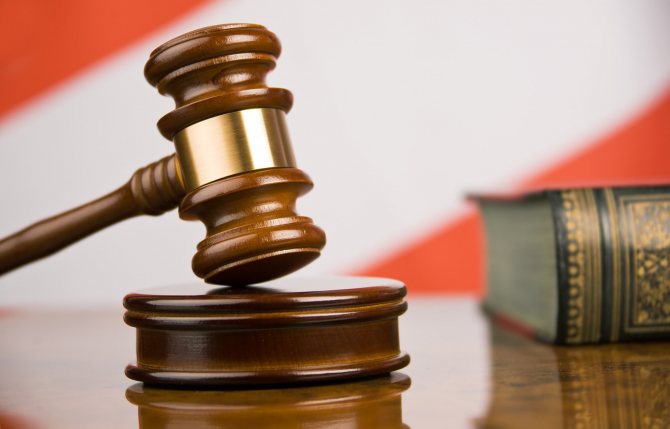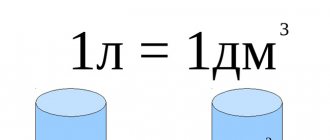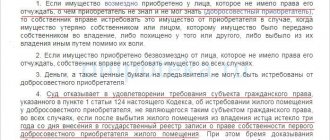A homeowners' association is a legal entity that is created for the purpose of managing an apartment building and common property.
The activities of HOAs are regulated by certain regulatory legal acts.
Previously, there was a single law that directly related to the activities of owners' associations. Currently, issues of this nature are regulated by the Civil and Housing Codes of the Russian Federation. They contain all the main provisions related to HOAs. Including the creation and liquidation of partnerships, as well as membership in them.
Homeowners' Association Law
The main regulatory act, which previously regulated everything related to the activities of HOAs, was the Federal Law of June 15, 1996 No. 72-FZ “On Homeowners' Associations.”
He established the following concepts:
- A homeowners' association is a non-profit organization created for the joint management and operation of common property.
- The homeowner is the owner of the property in the house.
- Premises - a unit in a residential area intended for technical needs or living.
- Common property is a part of a residential area necessary for its operation.
- A condominium is a single complex that includes not only the house itself, but also the surrounding area.
- Participatory share is a part of the common property belonging to the owner.
- Developer is any individual or legal entity engaged in the construction, acquisition or reconstruction of real estate.
These concepts are closely related to the activities of HOAs.
Scope of regulation
Law No. 72-FZ had a certain scope of regulation. It extended to relations related to property in a residential area that belonged to two or more owners, HOAs and housing cooperatives. It regulated the interaction that arose on the territory of the country with the participation of domestic and foreign individuals and legal entities.
Adoption history
Law No. 72-FZ was adopted in 1996. This was due to the need to systematize and streamline legal relations between property owners. Before the adoption of this regulatory act, only some laws stated that homeowners had the right to create partnerships. However, more specific information was not contained anywhere. And since the activities of HOAs have their own specifics, a separate regulatory legal act was needed that would regulate issues of this nature. For this reason, Law No. 72-FZ was adopted.
Grounds for cancellation
Federal Law No. 72-FZ is currently not applied because it has lost force.
This happened in connection with the introduction of the Housing Code of the Russian Federation. The official date of repeal of Law No. 72-FZ is March 1, 2005. It was from this date that the new edition of the Housing Code of the Russian Federation began to operate. The cancellation occurred due to the fact that a whole section concerning the activities of HOAs was introduced into the Housing Code. For this reason, Law No. 72-FZ has lost its relevance.
What does the HOA do?
After creating the organization, the owners independently determine the terms of reference of the HOA in accordance with Article 137 of the Housing Code:
- Signing agreements with service organizations and suppliers of utility resources to ensure a comfortable and safe life for residents.
- Carrying out a number of works with the involvement of hired workers and organizations for cleaning and garbage removal.
- Drawing up estimates and controlling costs for repair work with the involvement of contractor companies.
- Formation of a financial reserve for successful business activities.
- Payment of bills for service providers who carry out instructions from the HOA in the interests of home owners.
- Raising borrowed funds within the framework of the procedure prescribed by law.
- Disposal of common property on behalf of and in the interests of residents (rent, transfer of ownership to other owners, conclusion of exchange agreements), other legally significant actions with real estate included in the common property).
- Financial control and calculation of rent receipts.
- Acceptance of funds from receipts to pay for utilities.
- Work with debtors who are overdue on monthly payments, within the limits of activities permitted by law.
- Responsibilities of the chairman of the HOA and his rights
Each participant has the right to familiarize himself with the full list of affairs that the members of the HOA board and the chairman of the organization are obliged to organize. If desired, participants have the right to put to a vote proposals to improve services, improve the territory and optimize the costs of the partnership.
In the process of carrying out activities, the organization is engaged in the implementation of ongoing work. To monitor the quality of work and the legality of actions, a commission is appointed, consisting of persons who are not included in the number of participants in the partnership.
If in order to carry out a range of work on the house, the HOA needs to provide access to the apartment, the issue must be agreed upon with the owners. HOA members have access to the premises and areas of common property. Without the consent of the owner of the apartment, you can enter it only by a court decision if it is necessary to collect a rent debt. Enforcement measures against the debtor are carried out not by the HOA, but by bailiffs.
Preparation of certificates at the request of residents and official structures
Residents registered on the territory of an apartment building have the right to count on documentary support in the form of issuing basic certificates.
In the current mode, the board of the HOA building upon request prepares the following certificates:
- about family composition;
- apartment-by-apartment statements with all residents registered in the territory of a particular apartment;
- preparation of technical documentation and conclusions;
- recording facts of flooding and other damage to property through the preparation of special acts;
- condition of the structural elements of the house.
It is important to remember that failure to fulfill obligations to pay housing and communal services on time is not a reason to refuse to issue documents, since this infringes on the civil rights of residents who need certificates to apply to government agencies and courts.
Accrual of fines
Since the functions of the society involve the calculation of receipts and payment of services to utility companies, the board may charge fines and penalties for overdue contributions. By law, the board is not required to include a clause on the collection of penalties, since this measure is established by federal law.
The provisions of Article 155 (clause 14) of the RF Housing Code indicate the right to levy a fine from the next day after the delay occurs.
Based on the general principles of the law, penalties are calculated as follows:
- 1/300 of the Central Bank rate for debt over 31 days;
- 1/130 of the rate for debt over 3 months.
Entering new participants
- HOA membership: what is important to know
The homeowners association is obliged to accept new members into its ranks, in accordance with Art. 143 Housing Code of the Russian Federation. The basis will be the application received from the tenant, without additional contracts and other documents.
After purchasing an apartment, the new owner will have to contact the HOA to write an application, since automatic membership is not provided for. The right to service in the HOA is not transferred along with the property, but is re-registered after a change of owner.
All information about the participants of the partnership is stored in a special register maintained by the HOA.
Download the Application for joining the HOA (form) (25.5 KiB, 184 hits)
Sample contract with the HOA for maintenance (109.5 KiB, 238 hits)
Debt collection
Although the company is obliged to monitor timely payments, when posting lists of debtors, doubts arise about the legitimacy of the actions. On the one hand, such a measure can be qualified as public reprimand. On the other hand, the law does not allow the publication of information about the name and surname of the debtor (Law No. 152-FZ on the protection of personal data).
In order for the board to carry out actions to control the timely payment of fees, the solution would be to publish lists indicating apartment numbers and the amount of debt, without indicating the name of the owner.
Current legislature
Currently, issues related to the activities of HOAs are regulated by the norms of the Housing and Civil Codes of the Russian Federation. These legal acts contain articles and sections relating to this area.

Housing Code
The Housing Code of the Russian Federation most widely covers the activities of homeowners' associations. It contains an entire section 6, which regulates issues of this nature. It specifies the procedure for creating, reorganizing and liquidating an organization, its terms of reference, the rights and obligations of members, management and execution bodies, the competence of audit commissions, a list of property, and the specifics of economic activity. Also, separate articles of the Housing Code specify the procedure for holding general meetings.
Civil Code
The Civil Code of the Russian Federation also contains information related to HOAs. Specifically, Article 290 specifies a list of common property in an apartment building, and Article 291 secures the right of owners to form partnerships.
Gardening Partnership 2020: what has changed with the introduction of Federal Law 217
- Only one partnership can be created in one territory with a single infrastructure. In other words, you cannot create an SNT inside an ONT, or vice versa. The same plot of land cannot be located on the territory of several partnerships. The boundaries are determined in accordance with the territory planning documentation.
- All main issues of the partnership’s activities must be regulated by the charter (not regulations, not regulations, but specifically the charter). The content of the charter is Article 8 of the Law. The charter is adopted (approved) by the general meeting of members of the partnership.
- Starting from 2020, a gardening partnership must have at least 7 members - citizens who are legal holders of land plots. It is better if there is a little more, otherwise if 1-2 members of SNT suddenly leave, they risk being at risk of liquidation.
- Owners of land plots within the boundaries of a partnership can have one of two statuses: members of the partnership or persons who are not members of the partnership (formerly “individuals”). Even if “individuals” do not use common property, but their land plot is located within the territory of the Partnership, they are required to pay both targeted contributions and membership fees - in this way they fulfill the requirements of Art. 210 of the Civil Code of the Russian Federation on the maintenance of property owned by them. This obligation of “individuals” is compensated by their ability to vote on issues on the meeting agenda related to the common property of SNT and contributions.
- The highest governing body of SNT is the general meeting of members. The meeting elects other bodies: the chairman (sole executive body) and the board (collegial executive body). The term of office of the chairman and members of the board is up to 5 years, determined by the SNT charter (after 5 years, persons can be elected for a new term). The number of board members, including the chairman, must be at least 3 people and no more than 5% of the total number of SNT members.
- Each SNT must create an audit commission (at least 3 people) to control financial and economic activities, including the chairman and board. The members of the commission (auditor) are elected by the general meeting and are accountable to it.
This is interesting: Calculate sick leave for 2020 if there is no data for 2017
Horticultural Partnership in 2020: changes in the organization
A garden partnership, unlike a garden partnership, presupposes the existence or construction of houses on land for temporary (seasonal) or permanent residence. On the basis of such a partnership, a homeowners' association (HOA) can be created. In this case, the partnership continues to operate in the gardening regime, but in addition to the norms of Federal Law 217 on gardening partnerships, it will be subject to the norms of housing legislation.
- HOA charter;
- minutes of the meeting where the decision to create the partnership was made;
- fills out a special form, which is essentially a statement of desire to register an HOA, which contains information about the persons who voted at the general meeting for the creation of a homeowners’ association, about the shares owned by these persons in the right of common ownership of common property in an apartment building;
- a receipt confirming payment of the state duty.
Creation procedure
The process of forming a partnership consists of several successive stages. Any owner of real estate in a residential area can initiate the procedure. However, persons who do not have this status do not have such a right.
First, it is necessary to inform all owners about the general meeting, at which the corresponding decision will be made. The most common way is to post information in public places. This could be the entrance. Personal notification of each owner is also allowed. But this option is more time-consuming. Regardless of the method, the owners must be informed of the date, time and place of the meeting, as well as the issues that will be brought up for general discussion. It should be noted that not only the owners themselves, but also their legal representatives can take part in the procedure. The latter must have powers of attorney.
A positive decision will be valid only if more than half of the owners voted for it, that is, fifty percent plus one person. The results of the meeting are documented in minutes.
Its text should indicate:
- Date and location.
- Total number of people present.
- Information about the chairman and secretary.
- Issues submitted for general discussion. In this case it will be the creation of a partnership.
- Number of votes for, against and abstentions.
The protocol must be signed by all those who voted for the creation of the partnership. Simultaneously with the creation of the organization, its Charter must be approved. After this, the partnership must be registered. To do this, you will need to make copies of the protocol and the Charter and have them certified by a notary. Next, these documents, together with the application and information about those who voted for the creation of the organization, are sent to the Federal Tax Service. At the end, the HOA is entered into the register of legal entities and a certificate of registration is issued, which is kept by the board.

A partnership can be created not only by the owners of apartments in the same building. This right is given to residents of several areas located within the same area, as well as owners of neighboring private houses and summer cottages.
Organization membership
You can join a partnership on the basis of an application sent to the board. However, only the owner of the property has this right. They do not have to be the one who took part in the construction of the house as a shareholder. The buyer, recipient or heir of the property can become a member of the HOA, provided that he has registered his ownership rights in the manner prescribed by law. In the same way, exit from the HOA occurs. The person will have to submit a corresponding application. Regardless of the nature of the appeal, the final decision is made at the general meeting. At the same time, a person cannot be denied his request, since membership in the partnership is possible only on a voluntary basis.
A person who has joined an organization must provide information about himself and his real estate for inclusion in a special register. The information must be reliable.
Management Bodies
In accordance with Article 144 of the Housing Code of the Russian Federation, the management bodies of the partnership are determined. They are the general meeting and the board. Each of them is endowed with their own powers.
The General Meeting is the main body. It is he who makes the final decisions on any issues relating to the activities of the partnership. The specific list of members of such a body is determined by the participants of the organization. Decisions are made based on the majority of voters who took part in the meeting.
The competence of this body includes the following:
- Approval of the Charter and amendments to its content.
- Reorganization and liquidation of the partnership, appointment of a commission for this, approval of interim and final balance sheets.
- Board elections.
- Appointment of auditors.
- Determination of the amount of mandatory membership payments and contributions.
- Creation of a reserve fund.
- Obtaining loans and credits.
- Development and approval of plans for the repair of common property for the year, as well as cost estimates, reports, and auditors’ opinions.
- Conducting proceedings on complaints against the board and its chairman.
- Development and approval of internal rules of procedure for specialists who are involved in the maintenance of common property.
- Establishing the amount of remuneration for the chairman and members of the board.
The general meeting may also consider other issues if this does not contradict the requirements of the current legislation.
The board of the partnership is the executive body. He is subordinate and accountable to the general meeting. It usually consists of an odd number of members. They elect a chairman and a secretary.

The responsibilities of such a body include:
- Strict compliance with the requirements of current legislation and the rules of the organization’s Charter.
- Monitoring the process of making mandatory payments and contributions by owners.
- Preparation of financial estimates and reports.
- Management of a residential area or conclusion of necessary contracts.
- Hiring specialists to maintain common property.
- Maintaining a register of HOA members.
- Organization and holding of the general meeting.
- Perform other duties specified by the organization’s Charter.
At the same time, the general meeting has the right to resolve issues that fall within the competence of the board.
Authority
The law imposes a number of obligations on the partnership itself. These include:
- Compliance with the requirements of general regulatory legal acts, as well as the Charter of the partnership.
- Residential area management.
- Fulfillment of contractual obligations.
- Ensuring the proper technical and sanitary condition of common property.
- Respect for the rights and legitimate interests of owners, as well as control over the fulfillment of their obligations for the maintenance of the residential area.
- Taking measures to stop actions that may cause damage to common property.
- Representing the interests of owners in relations with third parties.
- Maintaining a register of partnership members.
- Submission to the authorities of information on changes made to the Charter within three months from the date of state registration of the amendments. In this case, it is necessary to attach certified copies of protocols and additions.
The terms of reference of the partnership may be expanded by the rules of the Charter.
Review of changes in housing legislation of the Russian Federation for the first half of 2020
June 07, 2020 the amendments introduced by the Federal Law of June 06, 2020 N 129-FZ “On Amendments to the Federal Law “On the Use of Cash Register Equipment for Payments in the Russian Federation”” came into force, exempting HOAs/housing complexes/housing cooperatives from the obligation to use online -cash in some cases.
General meeting of owners
For 2020-2023, indices of changes in the amount of payments made by citizens for utility services on average for the constituent entities of the Russian Federation and maximum permissible deviations for individual municipalities from the value of the established indices have been approved
3 reasons for housing and communal services organizations to install online cash registers in advance Among the reasons to cancel the obligation of the housing association/homeowners association/distributor association to install and use online cash registers, deputies of the State Duma of the Russian Federation cite the impossibility of fulfilling the requirements for the transfer of cash receipts to the payer within the time limits specified in the law. According to Part 5 of Art. 1.2 No. 54-FZ, organizations that accept payments from clients using non-cash payments are required to provide them with a cash receipt to their email address.
This is interesting: New documents for the expense report 2020
Organization's activities
For full functioning, the partnership has the right to carry out certain types of activities.
These include:
- Operation, maintenance and repair of real estate in a residential area.
- Construction of additional buildings and common property in the house.
- Transfer of part of material assets for temporary use to third parties. Here we are talking about renting and hiring.
Income received from the rental of property must be spent on the needs of the partnership. The specific intended use of the proceeds is determined by the general meeting of the HOA.

Liquidation procedure
The procedure for liquidating an HOA is not specified in the Housing Code. He makes only reference to the norms of civil law.
Reasons may include:
- The withdrawal of members from a partnership, as a result of which less than half of the property owners remain in it.
- Violation of the procedure for creating an organization.
- Expiration of the license to manage the house.
- Carrying out activities prohibited by law and the Charter.
The initiators can be the residents themselves, regulatory and supervisory government bodies.
The liquidation procedure consists of the following stages:
- Establishing the initiator.
- Formation of a list of organization members.
- Drawing up an application for liquidation of the partnership. It is signed by all owners who agree with it.
- Submitting an appeal to the HOA board or court.
- Making an appropriate decision.
- Creation of a liquidation commission.
- Sending information to the Federal Tax Service and the media.
- Drawing up a liquidation balance sheet.
- Repayment of debts to service organizations.
- Sending documents to close a partnership.
The time period for liquidation of a partnership is not defined by law.
This duration is established only for certain periods. For example, information must be sent to the tax authorities within three days from the date of adoption of the relevant decision, and the liquidation balance sheet can be drawn up no earlier than two months later. In practice, the liquidation procedure can last up to a year.
Also, to implement the procedure, you will need an application, a decision of the general meeting, a financial balance, a receipt for payment of fees, information about the organization’s employees in the Pension Fund. In some cases, additional information may be required, such as a court decision.
SNT in 2020: charter, new law
Innovations also affected aspects of partnership management - now chairmen, members of the board and the audit commission must be elected for a period of 5 years (previously re-election was carried out every 2 years). Moreover, the law states that the association must be managed by at least 3 people and no more than 5% of the members of the partnership. Any minutes adopted at a meeting must be signed by all participants, and not only traditional but also electronic means of communication should be used to distribute notices of meetings.
- A project is being developed in which the requirements of the Federal Law must be met.
- The document is being discussed at a meeting of the Board members. If it does not cause controversy, then it is submitted for discussion and approval during a meeting of members of the partnership.
- The full text of the Charter must be made available for review to all participants conducting activities in areas owned by SNT at least 14 days before the meeting.
- All participants of the partnership are convened.
- A protocol is drawn up with the results of the meeting, which indicates that the Charter was adopted in accordance with the procedure.
- A package of documents is being compiled that will be submitted to the Federal Tax Service. It consists of an application for state registration of changes made in the constituent documentation, minutes of the meeting with the decision to make and approve changes to the Charter, two copies of the new Charter, as well as a receipt indicating payment of the state duty. The entire package is certified by a notary, and then transferred to the tax authority at the place of registration of the partnership.
We recommend reading: Discharge from a non-privatized apartment without consent








